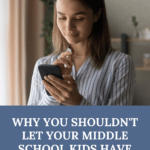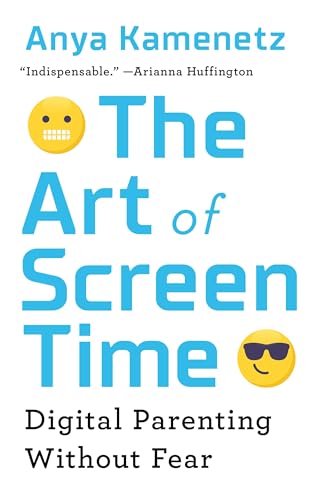Inside: Social media isn’t meant for middle school kids and in most cases it only creates more problems at an already difficult stage of life.

Middle School kids should NOT have social media.
They just shouldn’t and for so many reasons. Study after study has shown the impact of social media use on kids mental health. And almost daily there are news stories about kids taking their own lives because of cyberbullying or being lured into dangerous and life threatening situations by online predators.
Yet, more and more middle schoolers are using social media. It is estimated that almost 38% of tweens have social media accounts and their average time online has surpassed five hours a day! What is going on?
Teaching Kids The Rules Don’t Apply To Them
One of the first questions that should be asked is why are kids under 13 on social media at all?!
It is in violation of many of the social sites policies and in some cases is technically breaking the law according to the Children’s Online Privacy Protection Act (AKA COPPA – if you would like to know more click HERE to go to the COPPA website). Taking it a step further, in one of the few issues that politicians from both parties agree on, Congress has just introduced legislations that would BAN kids under the age of 13 from social media and would require parental consent for teens between the ages of 13-17.
Meta, who owns BOTH Facebook and Insta, states for accounts on both platforms “As per our terms, we require people to be at least 13 years old to sign up for Facebook or Instagram. In some countries, our minimum age is higher. When people open our apps to sign up for an account, we ask them for their birthday. This is called an age screen. Those who are underage are not allowed to sign up.”
The same goes for TikTok. According to TikTok’s terms and conditions, “the minimum age is 13. Users can choose to sign up with an email address or phone number. They can also use an existing Google, Facebook, Twitter or Instagram account. Once they have selected an option, they are then asked to enter their date of birth. If it calculates that the person is below the age of 13, the app displays the following message: “Sorry, looks like you’re not eligible for TikTok. But thanks for checking us out!”“
When a child creates a profile on one of these platforms, they have to attest to the fact that they’re at least 13 years of age. So, if you have a child under the age of 13 who you have knowingly allowed to have a social media account, what you’re saying to your kid is it’s okay to lie and that rules and even laws don’t matter.
In your mind maybe it’s just a little thing, it’s not like you gave them alcohol or helped them cheat on school work, right? Wrong. Either we follow the rules or we don’t. Kids lack the ability to discern which are big rules and which are small ones and overall, we’re sending them the message that the rules don’t apply to them. If we’re concerned about an entitlement generation, here is where it starts.
But beyond just teaching tweens about basic ethics and integrity, as parents, we should also be concerned about all the safety and mental health risks that come with social media use among tweens.
Tween Mental Health and Social Media
An increasing number of studies show the link between the use of social media and depression, self-esteem issues and anxiety in young people. Chris Said, a data scientist who has a Ph.D. in psychology from Princeton University and has worked at Facebook and Twitter says, “Social media was like a nuclear bomb on teen social life.”
The first smartphone was launched in 2007 and by 2012 50% of the population had them. It is now estimated that by age 12, 71% of middle school students have smart phones. And as smart phone usage has gone up and the use of social media among this age group, so have mental health issues.
According to Jean Twenge, a Professor of Psychology at San Diego State University, “every indicator of mental health and psychological well-being has become more negative among teens and young adults since 2012. The trends are stunning in their consistency, breadth and size.”
Twenge just published a new book, Generations: The Real Differences between Gen Z, Millennials, Gen X, Boomers, and Silents—and What They Mean for America’s Future. In it she states that across the board, since 2010, anxiety, depression and loneliness have all increased. “And it’s not just symptoms that rose, but also behaviors, including emergency room visits for self-harm, for suicide attempts and completed suicides.”
Social Media Disrupts Sleep Habits For Tweens
The rising rates of mental health issues among tweens are only compounded by the way that social media messes with their sleep. Tweens, which are kids between the ages of 9-12, should sleep between 9 to 12 hours per night.
Yet, its become clear that social media is keeping kids up and the number of hours tweens are getting on average per night is declining. Additionally, the blue light from devices suppresses melatonin production, which is the hormone that helps people sleep.
When tweens don’t get enough quality sleep it can affect make it more difficult for them to learn properly and to concentrate, which can impact their education. Plus, it can hurt their overall health making tweens grumpier, hungrier and less able to fight off infections.
Related: The Most Important Reason Teens Should Not Have Their Phones At Night
Online Predators
Another reason to keep kids under 13 off social media are the risks posed by online predators. From a development standpoint, its kids under the age of the 13 that are most vulnerable. The Center for Innovative Public Health Research states, “by about age 13, most teens understand the “social complexities of the Internet” and the need for exercising caution when on the web.”
Social Media is where more than 80% of child sex crimes start. The goal of internet predators is to coerce, manipulate, and even blackmail children and adolescents into sending sexually explicit content or performing sexual acts. Predators on social media have become more emboldened than ever with an over 97% rise in online enticement since 2019.
Inappropriate Content
Giving tweens social media accounts also gives them access to a wealth of content that isn’t intended for their age. And as the social media platforms already say that kids under 13 shouldn’t be on their platforms, they have no reason to regulate the content that is available. There is no “under 13 friendly” form of Instagram or TikTok.
As a result, tweens can be exposed to pornography, graphic pictures of self harm, accounts that promote eating disorders, hate posts and lots of other disturbing and harmful content. This isn’t even mentioning all the misinformation that spreads across social media accounts along with upsetting news stories.
A large percentage of tweens and teens report that they don’t tell their parents when they see unwanted material on their social media accounts. And an even larger percentage report lying to parents about their social media behavior and activity.
Is Social Media For Your Middle School Kid Really Worth It?
When you consider the seriousness of all these concerns, does it still seem worth it to let your middle schooler have social media?
The tween years are hard enough. Most people will tell you that middle school was the worst years of their life. Tweens this age feel awkward, out of place and often desperately insecure. And as we all know too well, kids this age also can be extremely cruel. Giving them yet another space where they can be rejected or made to feel like they aren’t enough, or where they could be bullied or even be the bully is just setting our tweens up for any number of bad outcomes. They have enough to deal with at this age, and it is such a tender age, they deserve our protection from yet another threat to their self-esteem and their overall well-being.
Having a social media account is not a necessity; it’s a choice. One that middle school children, yes children, are not equipped to make, and they are certainly not mature enough for all the consequences. Heck, most of us as adults don’t handle it well, so why do we think a 12-year-old will?!
This is why it is up to parents to make the right choice for them and “just say no” to social media for tweens
Yes, it is hard to say “no” when it seems like all their friends and classmates have it. Yes, it can be so frustrating to constantly battle with your tweens about technology. But saying “no” and fighting the good fight is so worth it in this case.
Related: Sometimes I Feel Like the Only Parent of Teenagers Saying No
And parents, even if you’ve already given in, you can still take it back. That is your right as a parent. When you know better, do better. Smartphones, social media and even privacy on smartphones and social media is not a RIGHT of our tweens or even our teens. We are the adults and we are the ones responsible for their physical safety and their mental health. We have to step up and do the hard job of parenting, which means setting rules and boundaries even when it makes them angry with us and even if it means going against the crowd.
Related: Here Are The Tech Rules You Need To Be Setting For Your Tweens and Teens
If You Still Think You’re Okay With Your Tween Having Social Media
As in all things in life, people will make different decisions for different reasons. If you are choosing to let your tween or teen have social media in middle school for whatever reason, then there are also steps you can take to better ensure their safety and mental health.
Install or Enable Parental Controls
Many smartphones come with parent controls that can be enabled. Unfortunately, they are also usually woefully inefficient. They are more about managing time spend on the phones or different apps vs actually dealing with what kids are doing or what content they are seeing. One of the most popular parental control apps at the moment is BARK which allows you to monitor and block content, manage time spent on social media and will alert you to potentially harmful interactions.
Related: The Best Parental Control Apps for Parents with Tweens and Teens
Use a Social Media Contract
Often one of the biggest issues with tweens and teens using social media is clear communication around rules and expectations. Understanding how to navigate social media is not intuitive or easy and we forget that sometimes when it comes to our digital native kids.
We need to sit kids down before we hand over a privilege like social media and have a conversation about responsible social media management and the consequences that come from not handling it correctly. We also need to make sure they know we are here to talk with them and our goal is not to punish them if they do something wrong, but to help them learn. Using a social media contract can be a great starting place for this conversation.
Related: Printable Social Media Contract
Make Sure You Have Logins and Passwords For All Social Media Accounts
If you’re going to allow your tween a social media account, it should be with the understanding that they will accept you as a friend/follower, and you will promise to be a silent guest on their accounts (i.e. no likes or comments). Additionally, you should have the logins and passwords to ALL their social media accounts so you can check them regularly including all messaging that might be going on.
Create Some Kind of Family Social Media Account
Perhaps there is a middle ground to be had here where your child has access to a social media account, but where it isn’t necessarily their profile. Consider it training wheels for their own account. I had zero interest in having a SnapChat account, but I downloaded the app and allowed her to use on my phone. This allowed her to communicate with a few friends that I knew as well as her cousins and her older brother when he went away to college.
Several other friends I know started social media accounts for their dogs. The kids enjoyed posting silly pictures of their furry friend, but could also use the account to connect with friends and stay in the loop socially. But this was account that the parents also used and had access to, so the tweens knew there was active oversight and involvement.
Ultimately, it still seems like waiting until your middle school kid is at least 13 before allowing social media is the wisest move. In fact, many parents feel so strongly about this that its actually given life to a powerful social movement of it’s own called Wait Until 8th that is helping parents with the education and tools they need to delay today’s tweens entrance onto the social media scene.
However, whatever choice you make, you love your kids and want what is best for them and you are the only one who truly knows what that looks like for your family.
Resources for Managing Social Media With Tweens
Generations: The Real Differences Between Gen Z, Millennials, Gen X, Boomers, and Silents—and What They Mean for America’s FutureThe Parent’s Handbook for Talking WITH Your Teens About SOCIAL MEDIA: The RIGHT WORDS and EFFECTIVE Techniques to Get Your Kids Safely On Board (Raising Cyber-Sensible Kids)
The Art of Screen Time: Digital Parenting Without Fear
Are you in the thick of raising your tweens and teens? You may like this book by Whitney Fleming, the owner of Parenting Teens & Tweens: Loving Hard When They’re Hard to Love: Essays about Raising Teens in Today’s Complex, Chaotic World.

Parenting Teens and Tweens is HARD, but these popular posts that other parents found helpful just might make it a little bit easier.
The Ultimate Parent Resource Guide For Teen Tech Use, Social Media and Safety
How To Protect Your Teen’s Self Esteem From Social Media Threats
Tired of Yelling at Your Teen to Get Off Their Phone? Try This Trick Instead
d10 Ways to Get Your Teenager to Stop Checking Their Phone
* This post contains affiliate links where we earn a small commission for sales made from our website.









Leave a Comment